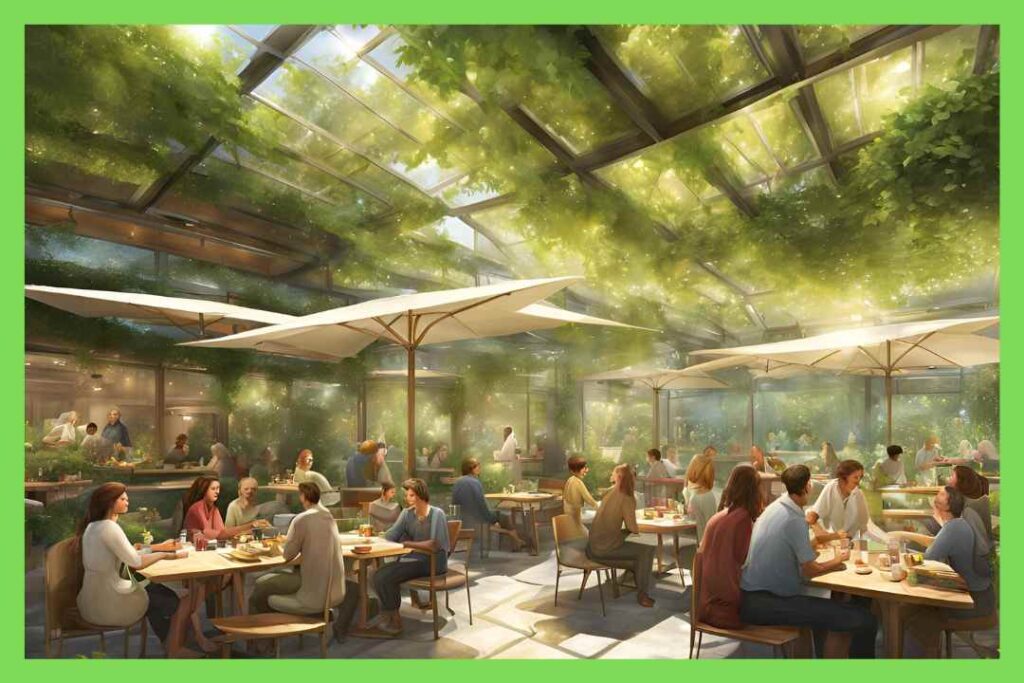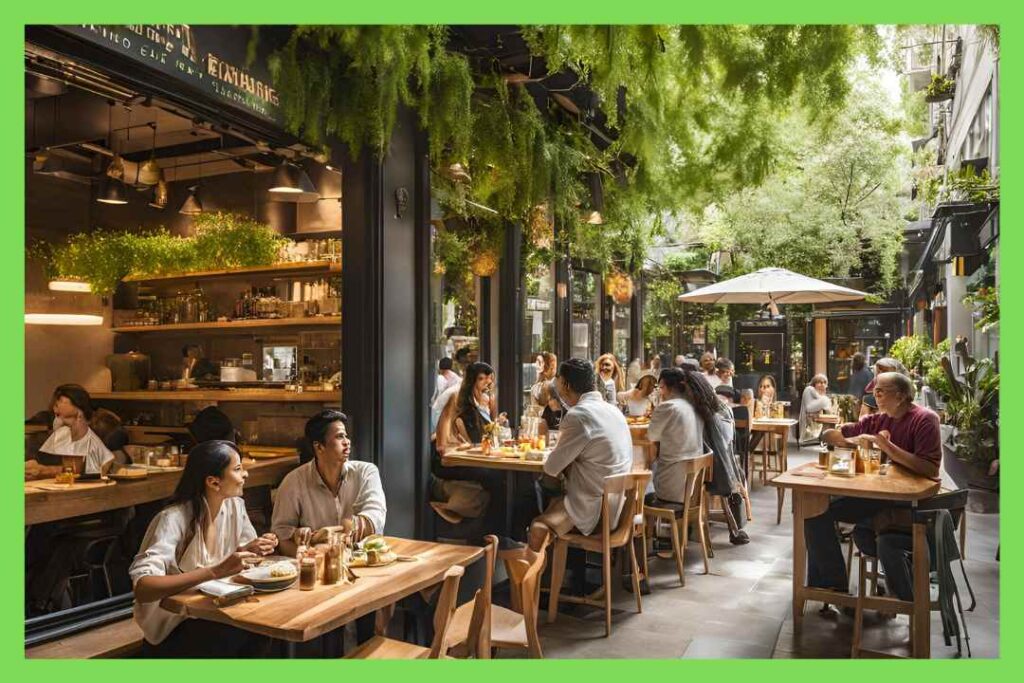In a world where climate change is urgent, eco-friendly restaurants play a big role. They do more than serve food; they lead a movement towards saving our planet. The food industry uses a lot of energy, water, and creates a lot of waste.
Choosing eco-friendly practices is now crucial, not just a trend. Sustainable dining tackles big ecological problems. It also attracts diners who care about the environment. This change helps the Earth and sets restaurants apart in today’s market.
The Growing Need for Sustainability in the Restaurant Industry
The restaurant industry is now more focused on sustainability because of growing environmental worries. These worries have made diners look for places that offer sustainable food choices. This shift towards green practices is more than just a trend; it’s a big change in how people think about food and eating out.
Impact of Environmental Concerns on Consumer Choices
Today’s consumers are more aware of environmental issues and make choices based on this. Many people see sustainability as a key part of their lifestyle. Restaurants that focus on sustainability can attract and keep customers better. People are even willing to pay more for meals that are good for the planet.
Statistics on Sustainability in the Restaurant Sector
Recent studies show a big change in what people want from restaurants. The US Restaurant Sustainability Study found that 70% of diners care about a restaurant’s green efforts. Many are ready to pay up to 20% more for food that’s better for the environment, especially among younger people. These numbers show how important sustainability is for restaurants’ success.
| Consumer Group | Willingness to Pay More | Importance of Sustainability |
|---|---|---|
| Millennials | 22% | High |
| Gen Z | 25% | Very High |
| Baby Boomers | 15% | Moderate |
Understanding Eco-Friendly Restaurant Practices

Eco-friendly restaurants aim to lessen their environmental footprint. They focus on health, saving resources, and well-being. By doing so, they influence how we eat and live.
Key Principles of Sustainable Dining
Sustainable dining is all about cutting down waste and boosting local economies. It includes:
- Local sourcing: Using ingredients from nearby farms to help local farmers and cut down on emissions.
- Seasonal menus: Creating dishes with ingredients in season, which makes food taste better and fresher.
- Waste reduction: Starting recycling and composting programs to keep waste out of landfills.
- Energy and water efficiency: Using smart technologies and practices to use less energy and water every day.
Examples of Successful Eco-Friendly Initiatives
Many restaurants worldwide are leading the way in eco-friendly practices. Here are a few:
- Petersham Nurseries in London: This place is all about using local ingredients and seasonal dishes. It shows their dedication to being green.
- Rosemary’s in New York City: This restaurant has a rooftop garden. It uses local produce, reducing its carbon footprint.
These restaurants show how eco-friendly practices can make them more appealing. They also help the environment and local communities.
Why are eco-friendly restaurants important?
Eco-friendly restaurants play a big role in reducing the environmental impact of the food industry. They help tackle big environmental problems in the food world. By using green practices, they make dining more responsible.
Addressing the Environmental Footprint of the Food Industry
The food industry has a big effect on climate change. Eco-friendly restaurants work hard to cut down this impact. They use green energy and manage waste well to lower emissions.
Many places use solar panels and composting. This helps use resources in a cycle that’s good for the planet.
Conserving Resources and Reducing Pollution
It’s key to save resources to fight pollution from eating out. Eco-friendly restaurants focus on using local and seasonal foods. They also choose sustainable seafood.
These steps cut down energy use and help nature. They make places more efficient and attract people who care about the planet.
| Practice | Impact on Environmental Footprint | Pollution Reduction |
|---|---|---|
| Utilizing Renewable Energy | Decreases greenhouse gas emissions | Reduces reliance on fossil fuels |
| Composting Waste | Minimizes landfill contributions | Lessens methane emissions |
| Locally-sourced Ingredients | Decreases transportation emissions | Supports local economies |
| Energy-efficient Appliances | Reduces overall energy consumption | Lowers carbon footprint |
Benefits of Sustainable Dining

Sustainable dining is good for restaurants and the planet. It helps businesses stand out in a competitive market. Let’s look at the benefits it offers.
Cost Savings Through Energy Efficiency
One big plus is saving money. Restaurants can cut down on utility bills by using energy-efficient stuff. For instance:
- LED lights use 75% less electricity.
- Energy-saving appliances use less water and energy.
- Good food storage means less waste.
These steps can make a restaurant more profitable over time.
Attracting Eco-Conscious Customers
Another big plus is attracting customers who care about the planet. More people want to eat in places that share their values. Restaurants that go green can:
- Keep customers coming back by connecting with them.
- Attract people who choose food that’s good for the planet.
- Join forces with local groups that care about the environment.
Being green can make a restaurant more popular and well-known.
Improving Brand Image and Reputation
Going green can also make a restaurant look better. People tend to like places that care about the planet. Key points include:
- Being seen as a good neighbor through green efforts.
- Getting good press for being eco-friendly.
- Working with companies that share green values.
A green brand can keep customers happy and loyal.
| Aspect | Benefits of Sustainable Dining |
|---|---|
| Cost Savings | Lower utility bills, reduced waste disposal costs |
| Customer Engagement | Increased loyalty, targeted marketing opportunities |
| Brand Reputation | Positive public perception, enhanced media attention |
Regulatory Compliance and Government Incentives
The restaurant world is getting more complex with environmental rules. It’s key for places to follow these rules and add green practices. They might need to handle waste, cut down on emissions, and use local, green ingredients.
Understanding Environmental Regulations for Restaurants
Restaurants can stay ahead by knowing about environmental rules. This helps them avoid fines and get benefits for being green. For example, they might get tax breaks or grants for using less energy or reducing waste.
Benefits of Compliance for Business Success
Following the rules helps restaurants avoid trouble and grow. Being green makes them more appealing to customers who care about the planet. This can make them more loyal and give them an edge over others.
FAQ
Why are eco-friendly restaurants important?
Eco-friendly restaurants are key because they tackle big environmental problems. They meet the needs of people who care about the planet. Plus, they help lessen the restaurant industry’s big ecological footprint.
What are some key practices of sustainable dining?
Important practices include using local and seasonal foods. They also cut down on energy and water use. Plus, they focus on reducing waste and recycling a lot.
How do eco-friendly restaurants reduce their environmental impact?
These places use green energy and cut down on food waste. They also use tech that saves energy and manage resources well. This all helps lower their carbon footprint.
What benefits can restaurants gain from implementing sustainable practices?
Restaurants save money on bills and attract customers who care about the planet. They also get a better reputation, which can lead to more customers and more money.
Are consumers willing to pay more for sustainable dining options?
Yes, many people, especially younger ones, are happy to pay more for green meals. They show a strong desire for sustainable choices.
What is the significance of local sourcing in eco-friendly restaurants?
Buying local helps the local economy and cuts down on emissions. It also means fresher food and supports sustainable dining. It’s a big part of being eco-friendly.
How can restaurants benefit from regulatory compliance regarding sustainability?
Following environmental rules helps restaurants avoid legal trouble and fines. It also lets them get government help for being green. This can make their business do well.
Source Links
- Sustainability in restaurants and why it matters – https://www.ecoleducasse.com/en/blog/sustainability-restaurants-and-why-it-matters
- Sustainability in restaurants and the rise of the eco-conscious consumer – https://www.simon-kucher.com/en/insights/sustainability-restaurants-and-rise-eco-conscious-consumer
- The Benefits of an Eco-Friendly Restaurant: Why Go Green – https://forestnation.com/blog/why-you-should-make-your-restaurant-eco-friendly/?srsltid=AfmBOoreQIH9-g_WDRprJuZOT9ISN2RCDX7ed8sch0XK4iNv1GwyQJiF
